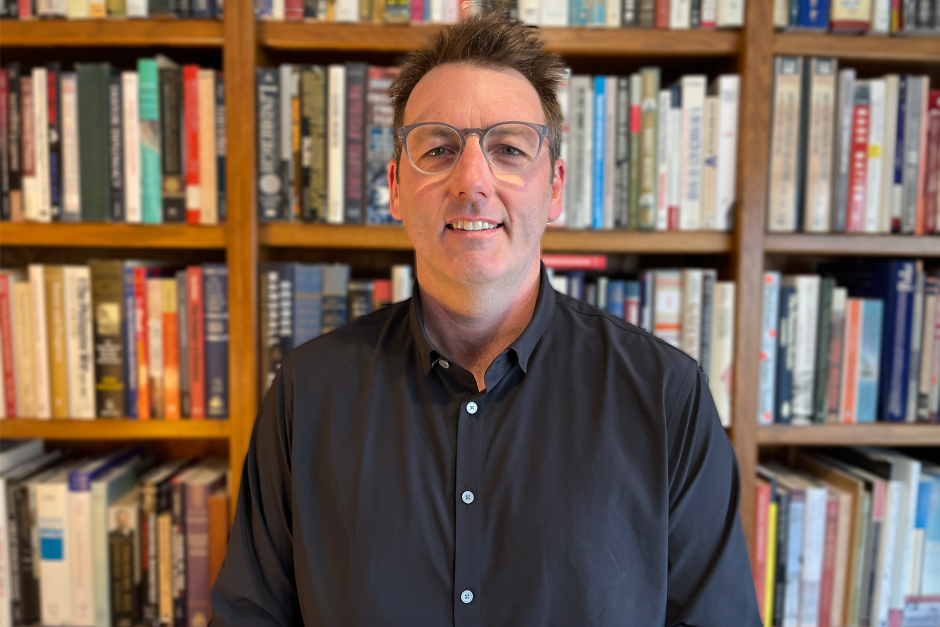By Eric Stann

March 13, 2024
Contact: Eric Stann, 573-882-3346, StannE@missouri.edu
Photo by Pate McCuien
In fourth grade, Jay Sexton first encountered one of James McPherson’s most influential works, “Battle Cry of Freedom: The Civil War Era.” That experience would ignite a lifelong passion for studying history and establish an ongoing legacy as a preeminent scholar in the study of the American story.
As director of the Kinder Institute on Constitutional Democracy at the University of Missouri — a world-renowned academic center devoted to the study of the American founding, including constitutional and democratic principles, history and traditions — Sexton was recently named a recipient of the Southeastern Conference (SEC) 2024 Faculty Achievement Award. The recognition is given annually to one professor from each university within the SEC.
“It comes as no surprise that the SEC is recognizing Jay’s scholarship and research,” said Matthew Martens, MU interim provost and executive vice chancellor for academic affairs. “His work and his role as director of the Kinder Institute further strengthen Mizzou’s reputation as a leader in the field of constitutional democracy.”
Sexton, who has taught at MU since 2016, said he’s humbled to receive this award, and credits the supportive community around him at Mizzou, including his colleagues in the Kinder Institute and the Department of History, for inspiring him to tackle difficult topics and help drive his field forward.
“I am so proud to receive this award, and I truly feel it reflects favorably on the wider team at Mizzou and the work we are doing here,” said Sexton, who is also the Rich and Nancy Kinder Chair of Constitutional Democracy and a professor in the Department of History. “I am nothing without my colleagues.”
Sexton is deeply committed to developing engaged citizens who think and understand America’s government outside of political division, said Cooper Drury, dean of the College of Arts and Science and home to the Department of History.
“Jay inspires our students to use the American founding as a basis for understanding where we are today as a country,” Drury said. “As a prolific author and expert in the political and economic history of the 19th century, he can seamlessly translate that research into the classroom and spaces where his students are engaging in debate, reflection and understanding. We are proud to have him as a member of our faculty.”
Contextualizing history
Today, Sexton continues to share the book that started it all: McPherson’s 1988 classic — a book he considers as the master narrative of the American Civil War — with the Mizzou students who take his American Civil War history class each fall.
“Studying history is to explore how different forms of structuring human society took root in specific places at specific times,” Sexton said. “I construct my syllabi and class discussions in ways that frame the topic under consideration as a creation of historically specific forces, not as another link in the chain of some timeless struggle between the same forces of good and evil that we identify with today.”
Sexton encourages his students to look beyond the present and break out of the “national box” of thinking, an insight he first gained while studying abroad at Oxford University in England. To him, breaking out of the national box is all about contextualizing history.
“Approaching history in purely national terms — which is what Americans have traditionally done — has its limitations,” Sexton said. “Many students these days arrive on campus viewing history as an extension of the political battlefields of the present. This is the biggest obstacle I confront, because these views are about the present, not the past.”
Sexton’s research focuses on contextualizing the geopolitical position of the United States during the 19th century. Much of his efforts are centered around providing a perspective as seen from the international stage.
“I want to empower my students to consider how the United States fits into the wider world,” Sexton said. “That picture looks a lot different from an international viewpoint than when told using the same old national stories.”



